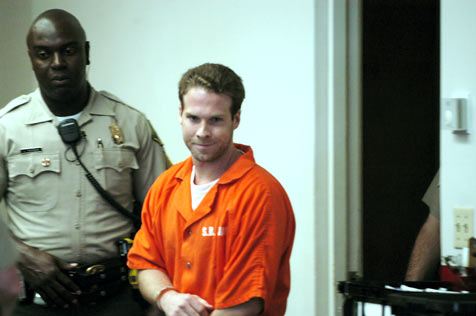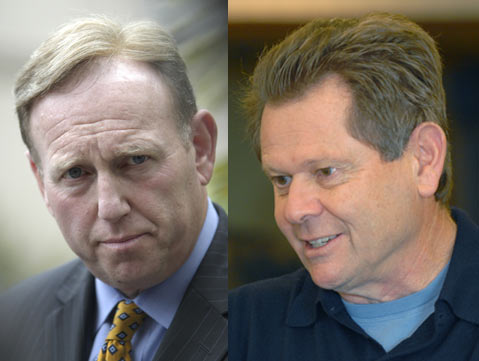Did Prosecutors Go Too Far in the Jesse James Hollywood Case?
Supreme Court Goes Hollywood

As the credits roll down the screen at the end of the 2006 film Alpha Dog-a dramatization of the Santa Barbara County murder of Nicholas Markowitz by a group of young men allegedly led by Jesse James Hollywood-the name “Ron Zonen” appears among the people and organizations thanked by the filmmakers. Now, as a result of his contributions to the movie, Zonen, a Santa Barbara County senior deputy district attorney, may be booted as the prosecutor on the Hollywood case by the California Supreme Court as a result of an alleged conflict of interest.
The Santa Barbara District Attorney’s Office had a busy day in front of the state’s highest court Tuesday, as Zonen’s was one of two cases to be argued before the justices. It’s been more than a year since the Court of Appeal decided that both Zonen-in his prosecution of Hollywood-and fellow Senior Deputy District Attorney Joyce Dudley-in her prosecution of a rape case-should be recused. The Supreme Court also heard another recusal case coming out of the Los Angeles Superior Court. At the center of the debates is whether prosecutors can compromise a case by participating in media ventures related to cases they are currently prosecuting.
The courtroom for Tuesday’s hearings was packed to capacity, with more than 100 people filling the available seats. An overflow room was filled with observers ranging from lawyers, law school students, and media to the curious general public-all centered around a tiny television with bad camera angles and even worse sound. The two cases everyone was focused on are described as companion cases and-by the defense in both cases-as “precedent-setting.” “This factual scenario you have before you has never occurred in this state,” said Hollywood’s defense attorney, James Blatt, during the second and higher-profile case. But Santa Barbara County Deputy District Attorney Gerald Franklin, Dudley and Zonen’s colleague, argued on their behalf that the matter is not a “first impression” case, as there is a “wealth of precedent to guide trial courts” in determining the merits of a recusal motion.

Right: Prosecutor Ron Zonen says he was only trying to help capture Hollywood.
According to the prosecution, Hollywood was the ringleader of a group of drug dealers who kidnapped the 15-year-old Markowitz in August 2000 and was the one who ordered that Markowitz be killed not long afterward. Within days of discovering Markowitz’s body, authorities had arrested four of those involved. All four eventually received long sentences. But Hollywood gave law enforcement the slip, fleeing to Brazil, where he lived in a small surfing town until March 8, 2005, when he was apprehended by authorities acting on a tip. In the meantime, Hollywood had become the youngest person to make the FBI’s “Ten Most Wanted” list, and movie producers became interested in the story. They came knocking at the door of Zonen, who while “Hollywood was sunning himself on the east coast of Brazil saw this as an opportunity to bring [the case] to the public’s attention” and capture the young fugitive, Franklin explained. Zonen apparently gave many, if not all, of his files related to the case to the makers of the movie.
Judge Brian Hill, the trial court officer in the Hollywood case, ruled there was no evidence of a conflict of interest by Zonen, a decision overturned by the Court of Appeal last year. Franklin argued both in his brief and in court Tuesday that the Court of Appeal declined to “review the matter under the differential, abuse-of-discretion standard of review” that every other court uses in deciding on a recusal motion, and that not paying deference to Hill’s decision was committing “judicial hubris.”
Blatt, however, said that Zonen’s quest for fame got in the way of doing what was right. “The court has to be concerned about the prospect of fame” and its impact on whether or not Zonen could properly prosecute the case, Blatt said. “He will not use discretionary powers in an even-handed manner to all portions of the case.” Blatt described Zonen as being “seduced by the aphrodisiac of fame” and, more than once, suggested that Zonen broke the law through his actions, although there has been no court forum or evidence in which those allegations have been brought to the forefront. Franklin, along with Deputy Attorney General David Glassman, countered that Zonen, who didn’t receive financial compensation for his consulting on the film, did nothing illegal or unethical. All he was trying to do, they argued, was increase publicity to find Hollywood. Indeed, said Glassman, Blatt would have had the court believe that Zonen’s “zeal knew no bounds in the apprehension of this petitioner.” Glassman, however, did admit that Zonen may have broken the law “through inadvertence or oversight.” It isn’t clear, should the high court side with the DA’s office, whether or not Zonen will continue prosecuting Hollywood. Currently, Deputy District Attorney Josh Lynn is handling Hollywood’s case at the trial court level.
While each side clearly had an agenda in attempting to sway the justices, they were at the mercy of the seven on the dais, who constantly shot questions at them. While a decision from the court won’t come until sometime in the next 90 days, and the justices didn’t offer any sort of opinion from the bench, observers could glean some information from the justices’ questions. The seven judges all seemed sympathetic to the prosecutor in the Hollywood case.
The judges seemed more split, however, when it came to Dudley’s case. Dudley is the prosecutor in a case against Massey Haraguchi, a man charged with drugging and sexually assaulting a woman. Dudley has self-published two books, one of which, Intoxicating Agent, is a fictional account of a district attorney prosecuting a man who allegedly drugged and sexually assaulted his victim. The book contains several other circumstances similar to those in Haraguchi’s case, such as dates, places, and character descriptions. Dudley has consistently claimed her novel was written before the alleged rape occurred. Bob Sanger, Haraguchi’s attorney, argued Dudley had an incentive to win the case to boost sales of her book. “This conflict of interest affects her ability to evaluate the case from beginning to end,” Sanger said, such as her willingness to negotiate a possible plea agreement. He also claimed Dudley abused her discretion as prosecutor, and under the existing standard for abuse of discretion, he said that “this book goes way over the top.” Franklin and Glassman, as in the Hollywood case, argued that the Court of Appeal once again overstepped its bounds, not using a “standard of review” backed by court precedent but instead setting new standards to apply to the case. They said that the Court of Appeal, which did call the case one of first impression, should have looked more closely at the ruling of the trial judge-in this case Superior Court Judge Frank Ochoa.
For now, lawyers around the state and specifically in Santa Barbara wait to see what the Supreme Court ultimately decides will give the two defendants in two different cases a fair trial. Perhaps Sanger said it best, in a nice summation of the reason the separate parties had gathered in court Tuesday: “We want people representing justice to do justice.”



